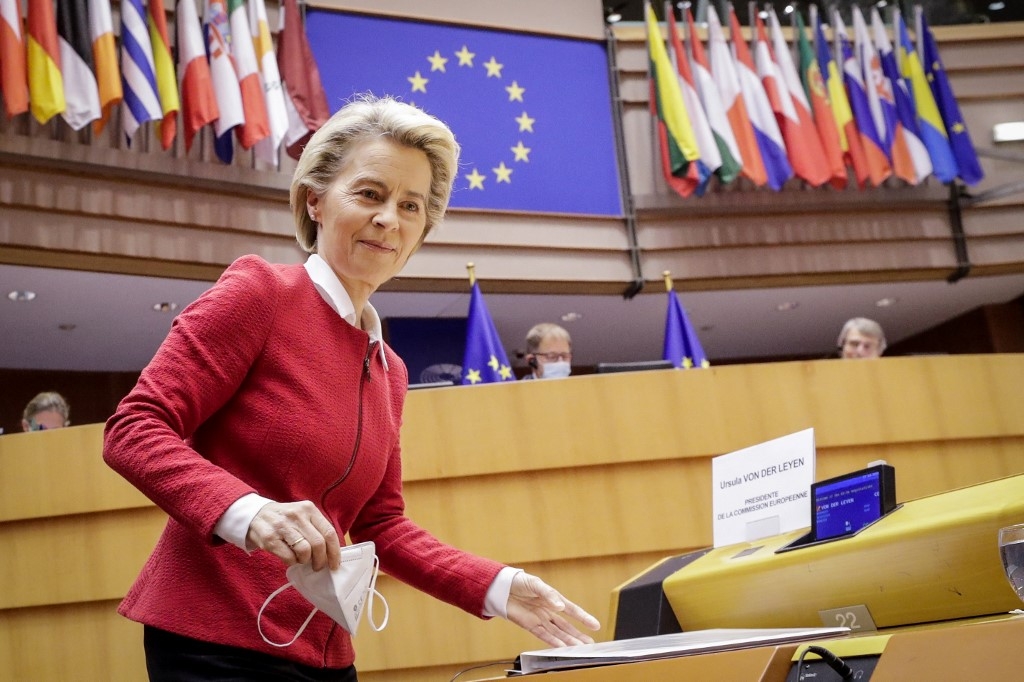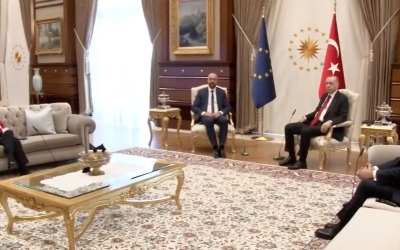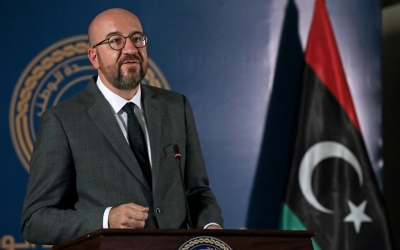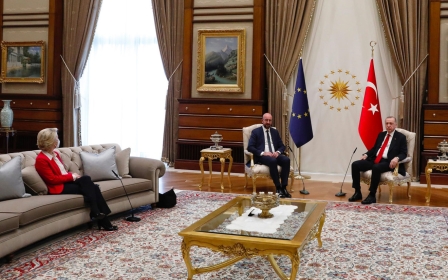Turkey slams EU’s Ursula von der Leyen for saying Sofa Gate was related to gender

Turkey criticised European Commission President Ursula von der Leyen on Wednesday for claiming that she was mistreated three weeks ago during a meeting with the Turkish president because of her gender.
“The dispute regarding the seating order during the EU Commission’s visit to our country has nothing to do with being a woman or being European," Turkish foreign ministry spokesperson Tanju Bilgic said in a formal statement.
New MEE newsletter: Jerusalem Dispatch
Sign up to get the latest insights and analysis on Israel-Palestine, alongside Turkey Unpacked and other MEE newsletters
“It was a result of [an] EU protocol’s internal lack of coordination and negligence. Turkey has satisfied all the submitted demands [during the visit].”
Known as Sofa Gate, the incident occurred when President Recep Tayyip Erdogan hosted EU leaders in Ankara early this month, and von der Leyen was not given a seat – instead, she had to sit on a distant sofa.
Social media users were quick to accuse the Turkish government of misogyny or a deliberate snub, as Erdogan sat next to European Council President Charles Michel at the front of the room. Von der Leyen was left standing awkwardly, and appeared to look around before finding a spot on a sofa several feet away.
The Turkish foreign ministry said Ankara was not discriminating against any foreign dignitary based on gender and that it has a long-standing experience of diplomatic hospitality that no one should dare question.
“It is saddening that this incident, which was caused by political infighting within the EU, is still exploited by some EU countries and associated with gender discrimination,” the Turkish statement continued.
'Alone as a woman'
Speaking to the European Parliament on Monday, a visibly angry von der Leyen said the incident on 6 April showed disdain for female politicians.
"I cannot find any justification for how I was treated... so I have to conclude that it happened because I am a woman," she said.
"I felt hurt, and I felt alone as a woman and as a European," von der Leyen told EU lawmakers, taking a jab at Michel, who was heavily criticised by many EU politicians for not intervening on her behalf in Ankara.
"I am the president of the European Commission, and this is how I expected to be treated when visiting Turkey (...) but I was not," von der Leyen said. "This shows how far we still have to go before women are treated as equals - always and everywhere."
However, multiple Turkish officials who spoke to Middle East Eye earlier this month denied responsibility for the "chair gaffe", saying that it was all the EU delegation's fault. They blamed a rivalry within the EU, between Michel and von der Leyen, who are typically seen as almost equals within the Union.
One senior Turkish official said Michel's staff had agreed on the seating before the visit took place. "However, there was no representative from von der Leyen's team," the official said. "So we didn't get their input."
A second senior Turkish official said every arrangement during the visit was made in collaboration with EU officials who visited the country before the summit took place.
Politico also reported that Michel's team thought everything ran according to protocol, as Michel was higher in the diplomatic pecking order, seemingly confirming Turkish officials' reports. Von der Leyen's spokesperson, on the other hand, insisted that she should have been seated exactly in the same manner as the president of the European Council.
'Collateral victims of quarrel in Brussels'
French news website l’Opinion said earlier this month that Ankara was “only the collateral victims of the small quarrels in Brussels” between Michel and von der Leyen.
“Their relationships have been hateful from day one!" the MEP Arnaud Danjean told l’Opinion. "The Turkish episode is only the most visible incident, but there are almost daily incidents between them and their teams. Protocol, communication, attributions… it’s a permanent war.
"They are two figures with fragile legitimacy," he added, "who seek to assert themselves because they know that their natural authority over their peers is very weak, if not non-existent."
Middle East Eye delivers independent and unrivalled coverage and analysis of the Middle East, North Africa and beyond. To learn more about republishing this content and the associated fees, please fill out this form. More about MEE can be found here.






